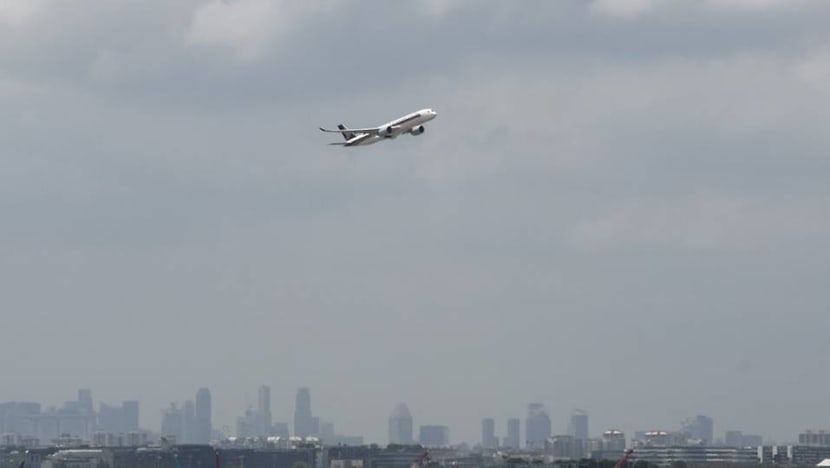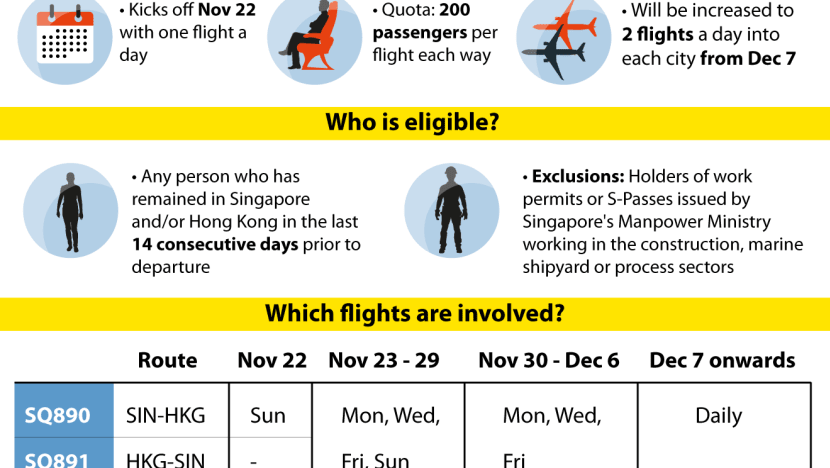No 'huge increase' in demand expected from Singapore-Hong Kong air travel bubble, say aviation analysts

A Singapore Airlines plane takes off from Changi Airport. (File photo: Roslan RAHMAN/AFP)
SINGAPORE: Even as flight tickets between Singapore and Hong Kong are being snapped up after details of the air travel bubble were announced, aviation analysts said such arrangements may not be the lifeline airlines are hoping for.
There might not be a "huge increase" in the demand for tickets, given that COVID-19 tests need to be taken, said one expert.
On Wednesday (Nov 11), the Civil Aviation Authority of Singapore announced that the air travel bubble between the two cities would begin on Nov 22, with one flight a day into each city with 200 passengers each way. This will increase to two flights a day into each city from Dec 7.
Travellers between the two cities will not have to be quarantined or serve out a stay-home notice, but must test negative on COVID-19 polymerase chain reaction (PCR) tests within 72 hours before their scheduled departure time.
Travellers have to take dedicated flights, but will have no restrictions on their travel purpose and do not have to follow a controlled itinerary.
The opportunity for leisure travel appears to have already attracted some, with flights from Singapore to Hong Kong on Nov 22 already sold out.
READ: Singapore, Hong Kong air travel bubble to start on Nov 22 with 200 travellers each way per day
“This is likely to elicit more excitement and interest from Singaporean travellers than Hong Kongers who typically are not among the top visitors to Singapore,” said Mr Shukor Yusof, founder of aviation consultancy Endau Analytics.
“In the short term, there will be a slight increase in the number of travellers between Singapore and Hong Kong. We do not expect a huge increase in demand given the fact that two to three tests are required before and after the trip," said Mr Herman Tse, aviation analyst at civil aviation market intelligence firm Ascend by Cirium.
He said taking the required COVID-19 tests was "a strong disincentive" for travellers.

OTHER POSSIBLE TRAVEL BUBBLES
The air travel bubble between Hong Kong and Singapore would serve as a benchmark for other countries and regions to follow, should it be successful, Mr Tse added.
“Malaysia, China, and Indonesia are possible for further air travel bubbles for Singapore, as these countries have frequent business activities with Singapore,” he said.
Mr Shukor identified Taiwan, South Korea and Japan as possible destinations for future travel bubbles, but he said that there were "not many choices", as popular destinations - especially those in Europe - were off limits due to the high number of COVID-19 cases.
Other possibilities - based on Singapore's pre-pandemic travel trends, as well as the ability to contain COVID-19 and the willingness to open up to international tourism - include New Zealand and Australia, said Alton Aviation Consultancy director Joshua Ng.
READ: Singapore-Hong Kong air travel bubble: What you need to know
A MULTI-DESTINATION AIR TRAVEL BUBBLE?
Singapore's Minister for Transport Ong Ye Kung said on Wednesday should the Hong Kong-Singapore air travel bubble be successful, he hopes to be able to “trilateralise” and “quadlateralise” the arrangement to add more members and create a more meaningful travel bubble.
Analysts said there would be hurdles in establishing such a multi-destination travel bubble.
“Multi-country travel bubbles will be very challenging as there are many issues to consider and agree," said Mr Tse, adding that countries and regions have to "be careful" in agreeing on air travel bubbles as any new outbreak would "put the situation back to square one".
“Until and unless there are agreements acceptable to all, international air travel will be fraught with bureaucratic challenges,” said Mr Shukor.
Responding to the announcement of the details of the air travel bubble, Singapore Airlines on Wednesday described the arrangement with Hong Kong as an “important step” in the ongoing recovery of the airline industry.
But industry watchers said that travel bubbles may not be the reprieve that airlines - which have been ailing for months due to border restrictions aimed at stopping the spread of the coronavirus - are hoping for.
READ: Air tickets between Singapore and Hong Kong on Nov 22 sell out, economy class seats hit S$1,000
“Air travel bubbles may boost air travel demand to some extent but the process involved is cumbersome, with multiple tests required even for a short trip, and this may thus act as a powerful disincentive to travel even within the bubble,” said Mr Tse.
“Given that there is no domestic traffic in Singapore, the recovery would be relatively slow compared to other countries such as China and Japan.
“The travel bubbles are critical for airline recovery but it will take time to build up travellers’ confidence.”
Mr Shukor said that air travel bubbles and other similar arrangements have been unable to "resuscitate airlines worldwide", in part due to governments not adopting a universal approach to border controls and measures to prevent the spread of the coronavirus.
READ: Requirements for Singapore-Hong Kong air travel bubble not meant to be 'totally symmetrical': Ong Ye Kung
Earlier this week, American pharmaceutical giant Pfizer said early data showed that its COVID-19 vaccine is 90 per cent effective.
The availability of a vaccine will be key to the recovery of the air travel industry in the medium to longer term, noted Mr Tse.
“Looking further ahead, the availability of a COVID-19 vaccine will have a far greater impact on travel recovery than travel bubbles," said Alton Aviation's Mr Ng.
"Given the impending vaccine approvals and potential availability in 2021, countries may take a conservative wait-and-see approach, rather than establish travel bubbles that may carry additional transmission risk."
BOOKMARK THIS: Our comprehensive coverage of the coronavirus outbreak and its developments
Download our app or subscribe to our Telegram channel for the latest updates on the coronavirus outbreak: https://cna.asia/telegram














